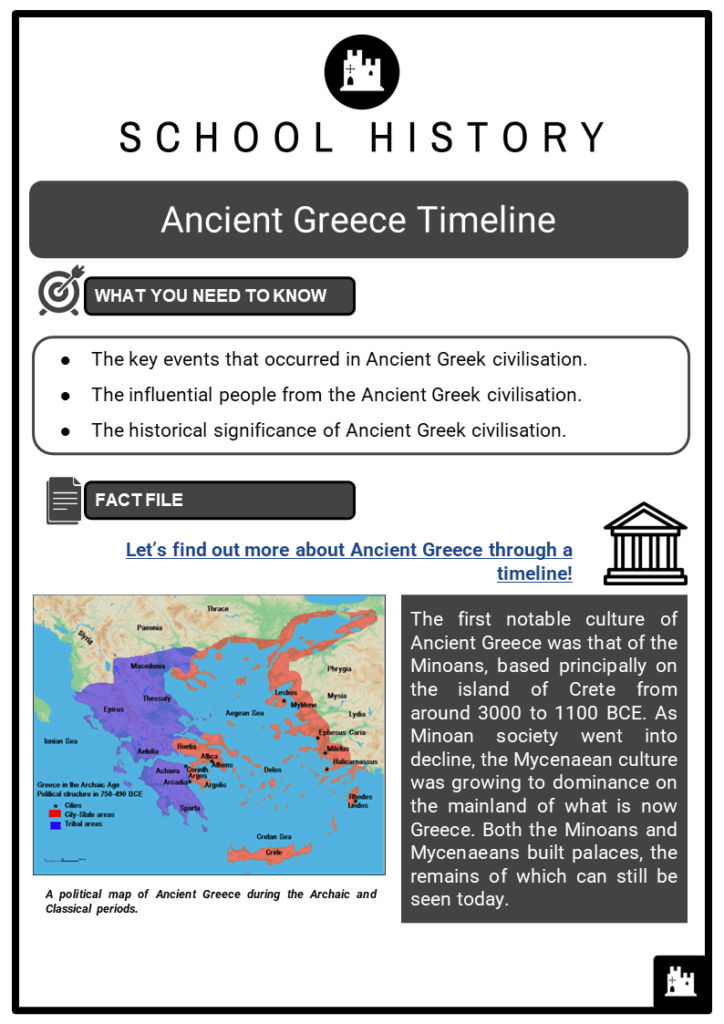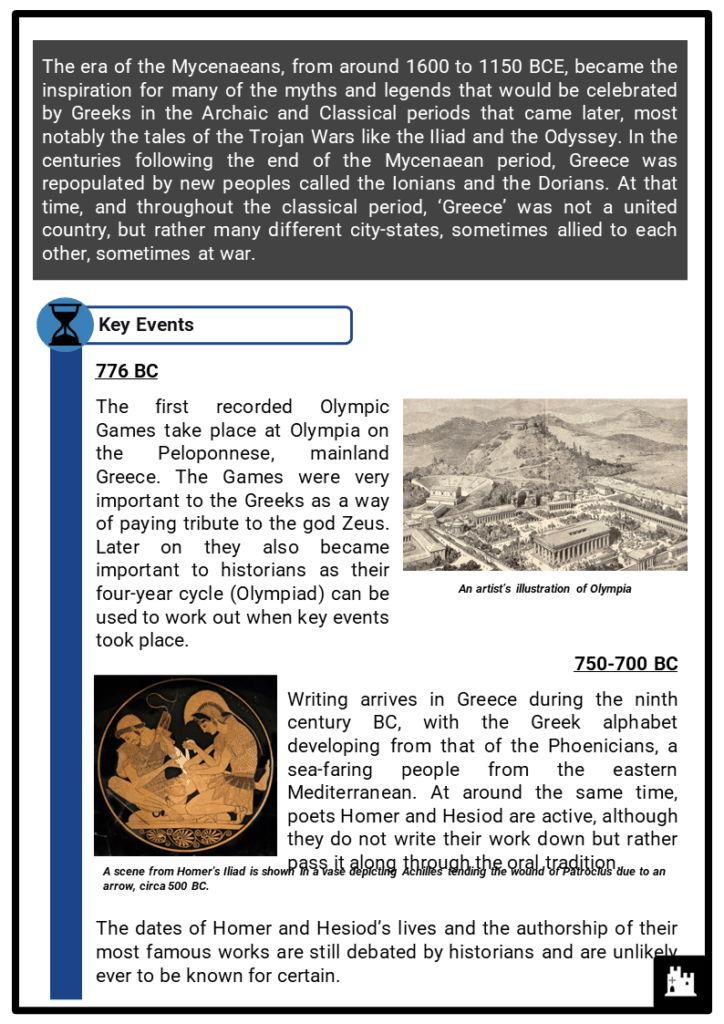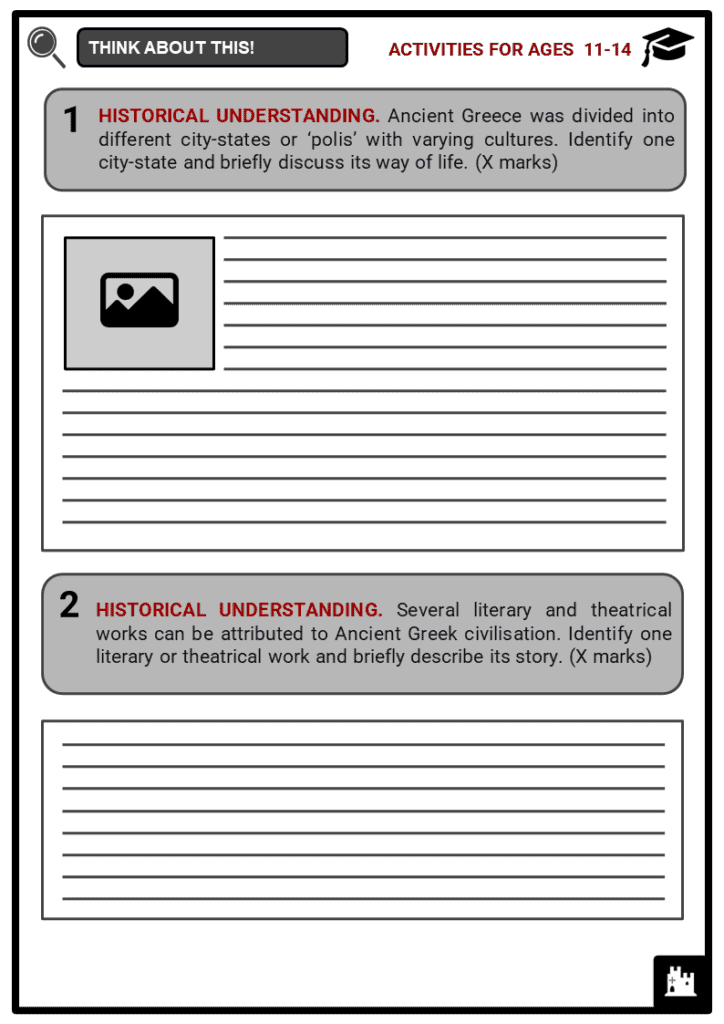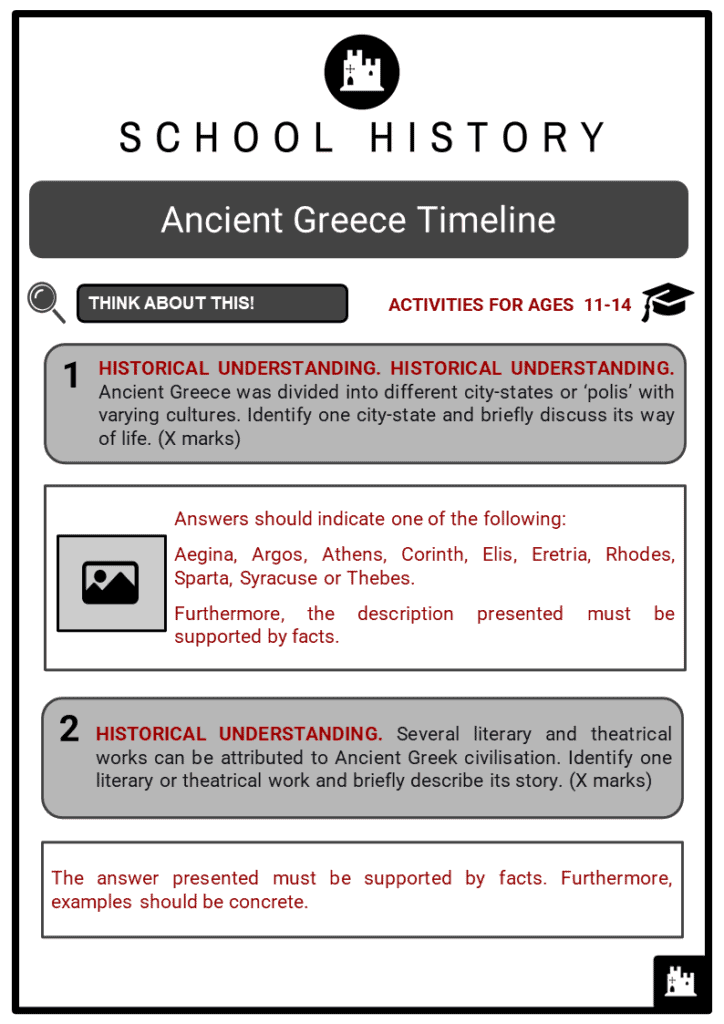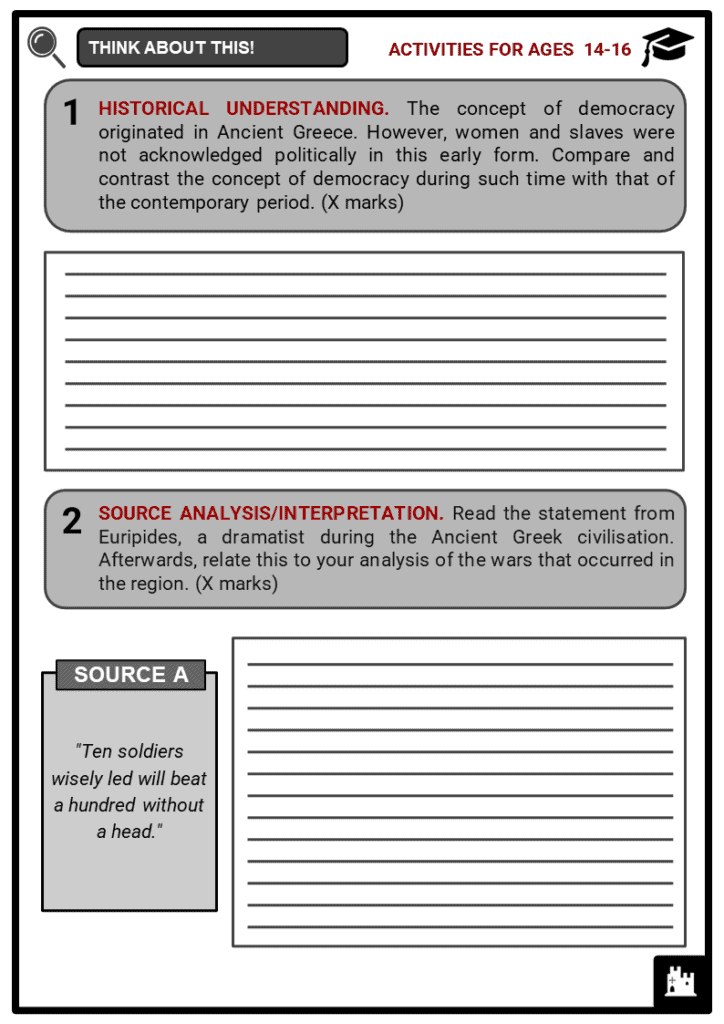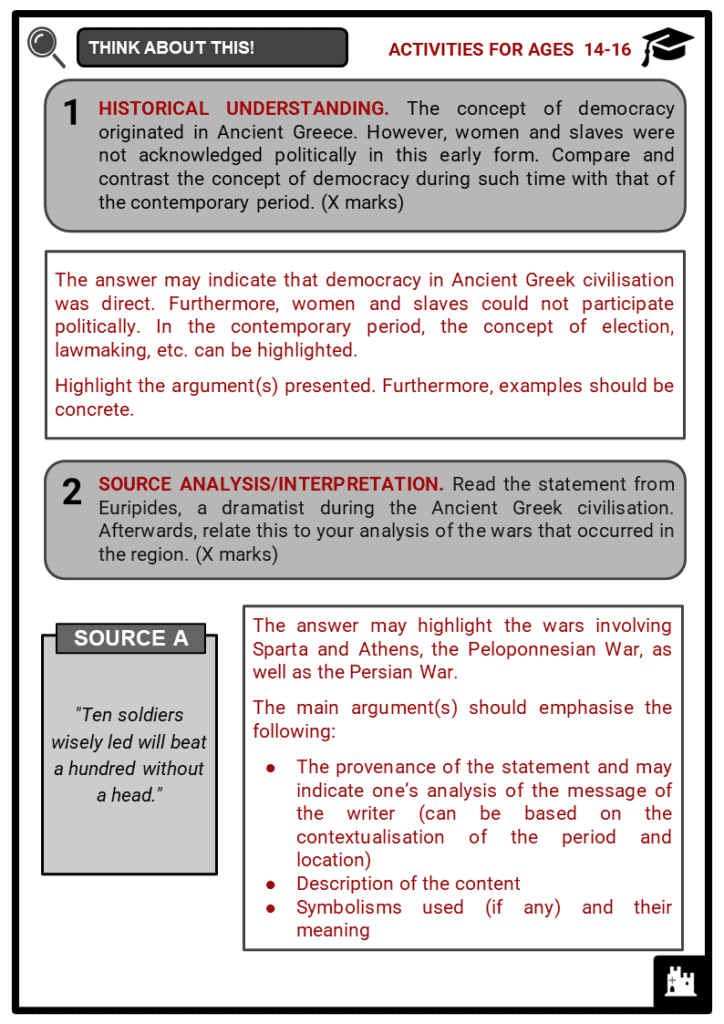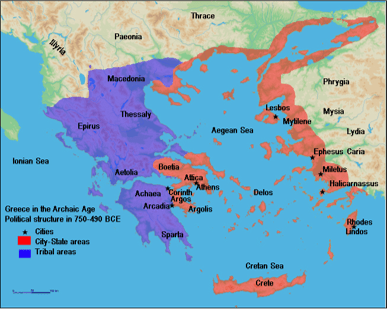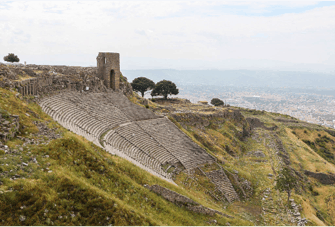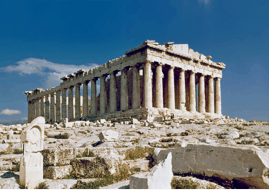Download Ancient Greece Timeline Worksheets
Do you want to save dozens of hours in time? Get your evenings and weekends back? Be able to teach Ancient Greece Timeline to your students?
Our worksheet bundle includes a fact file and printable worksheets and student activities. Perfect for both the classroom and homeschooling!
Table of Contents
Add a header to begin generating the table of contents
Summary
- The key events that occurred in Ancient Greek civilisation.
- The influential people from the Ancient Greek civilisation.
- The historical significance of Ancient Greek civilisation.
Key Facts And Information
Let’s find out more about Ancient Greece through a timeline!
- The first notable culture of Ancient Greece was that of the Minoans, based principally on the island of Crete from around 3000 to 1100 BCE. As Minoan society went into decline, the Mycenaean culture was growing to dominance on the mainland of what is now Greece. Both the Minoans and Mycenaeans built palaces, the remains of which can still be seen today.
- The era of the Mycenaeans, from around 1600 to 1150 BCE, became the inspiration for many of the myths and legends that would be celebrated by Greeks in the Archaic and Classical periods that came later, most notably the tales of the Trojan Wars like the Iliad and the Odyssey. In the centuries following the end of the Mycenaean period, Greece was repopulated by new peoples called the Ionians and the Dorians. At that time, and throughout the classical period, ‘Greece’ was not a united country, but rather many different city-states, sometimes allied to each other, sometimes at war.
Key Events
- 776 BC
- The first recorded Olympic Games take place at Olympia on the Peloponnese, mainland Greece. The Games were very important to the Greeks as a way of paying tribute to the god Zeus. Later on they also became important to historians as their four-year cycle (Olympiad) can be used to work out when key events took place.
- 750-700 BC
- Writing arrives in Greece during the ninth century BC, with the Greek alphabet developing from that of the Phoenicians, a sea-faring people from the eastern Mediterranean. At around the same time, poets Homer and Hesiod are active, although they do not write their work down but rather pass it along through the oral tradition.
- The dates of Homer and Hesiod’s lives and the authorship of their most famous works are still debated by historians and are unlikely ever to be known for certain.
- 625-595 BC
- The first life-size ‘kouroi’ (male figures) are sculpted in marble – at first they are formulaic but by the turn of the fifth century BCE have become more naturalistic. In pottery, the Attic ‘black figure’ style appears, followed in the second half of the sixth century by the red figure.
- Pottery is one of the most significant forms of Greek art as so much of it survives to the present day; as well as its importance in purely artistic terms, it also has depictions of everyday ancient life as well as scenes from myth, which have contributed to our knowledge of Ancient Greek activities and beliefs.
- 621 BC
- Draco institutes the first written laws in Athens. They become legendary for their harshness, and the word ‘draconian’ in English refers to any measure that is considered extreme.
- 594 BC
- The Athenian statesman and poet Solon introduces social, political and legal reform to roll back some of Draco’s harsher laws, like enslavement for people in debt. He also gave more representation to the people, and democracy is often said to have begun with Solon’s reforms.
- 560 BC
- Pisistratus becomes the tyrant ruler of Athens. In Archaic Greece, a tyrant was the name given to a state ruler who has come to power by unusual means, often a coup. It was not at the time seen as a negative term, and there could be ‘good’ or ‘bad’ tyrants.
- 534 BC
- The first tragic play is performed at the Dionysia drama festival in Athens. Tragedies were often based on myth and epic themes, and the first actor recorded as portraying a character on stage in a written play is Thespis, from whom the English word ‘thespian’, meaning actor, comes.
- 508 BC
- Following a period of tyranny, the lawmaker Cleisthenes introduces reforms in Attica, the region in which Athens is located. He reorganises the political system so that each local area (‘deme’) has fair representation in government, and enables people to be selected for office even if they are not a member of the traditionally powerful families.
- 490 BC
- The Athenians and their allies the Plataeans fight a large Persian army at the Battle of Marathon. The Persians had sent a large expeditionary force to subjugate Athens after it supported rebels against the Persian Empire. The Greeks won a great victory, proving that their soldiers, known as hoplites, and phalanx tactics, in which they fought in close formation, were effective against a more numerous enemy.
- 487 BC
- The first comic drama is performed in Athens. Comedy could be used as a sharp political weapon, as the plays enabled writers to make fun of people in public life and draw attention to their flaws.
- 480 BC
- The Persians mount a second expedition to Greece. Although they are victorious in the Battle of Thermopylae, they are lured into a naval attack in the narrow straits at Salamis by Athenian general Themistocles, and defeated. However, the Athenians are forced to abandon their city to the enemy as they retreat to their tactically strong position.
- 479 BC
- The Greek allies fight and win two more battles, on land at Plataea and at sea at Mycale, to drive the Persians out of mainland Greece. Although the Greek states fight together, Sparta and Athens are rivals wrestling for dominance over the other states.
- 478 BC
- Athens leads the foundation of the Delian League, a group of Greek states banding together for protection against Persia. The league is used by Athens to form an empire and enrich itself, becoming the dominant state in Greece.
- circa 469 BC
- The Delian League defeats the Persian Empire at the Battle of the Eurymedon in modern-day Turkey. This humiliating defeat effectively ends the risk that Persia would send another expedition to invade Greece.
- 461 BC
- Pericles comes to supremacy in Athens – he will be instrumental in Athenian politics for forty years, a period that becomes known as the Age of Pericles.
- 460 BC
- Athens’ rise to power leads to the outbreak of the First Peloponnesian War against the Peloponnesian League, led by Corinth.
- 454 BC
- The Athenians move the Treasury of the Delian League from the island of Delos to Athens, an act that clearly shows that the league has evolved from being a mutually beneficial arrangement to being an empire of Athens.
- 447 BC
- The building of the Parthenon begins, part of an ambitious building project initiated by Pericles to enhance Athens’ status as a great city.
- 445 BC
- Athens and Sparta, the latter as leader of the Peloponnesian League, agree to the Thirty Years’ Peace to end the First Peloponnesian War. Each state promises not to interfere in each other’s affairs or those of their allies.
- 431 BC
- Sparta declares war on Athens, claiming that it had breached the terms of the Thirty Years’ Peace, and the Second Peloponnesian War begins.
- circa 430 BC
- The sculptor Phidias completes his giant statue of Zeus at Olympia; it is later named one of the Seven Wonders of the World. However, it was destroyed in the 5th century AD.
- 421 BC
- After a period in which neither Sparta or Athens wins a decisive victory, the Peace of Nicias is agreed upon, bringing an end to the first phase of the war.
- 413 BC
- An Athenian campaign against the Sicilian city of Syracuse ends in disaster, with the expeditionary force destroyed. With Persia now supporting Sparta in the renewed hostilities of the Peloponnesian War, confidence in Athens is low.
- 405 BC
- At the naval Battle of Aegospotami, the Athenian fleet is routed by the Spartans, ending Athenian dominance of the seas and effectively dissolving its empire; the city of Athens is besieged.
- 404 BC
- With no fleet to keep the food coming into the city, Athens is forced to surrender, ending the Second Peloponnesian War and making Sparta the dominant Greek state. A group of oligarchs overthrow the democracy in Athens and institute the Regime of Thirty.
- 403 BC
- Democracy is restored in Athens after the fall of the Thirty.
- 399 BC
- The great philosopher Socrates is found guilty of heresy and of corrupting the youth of Athens and is sentenced to death by drinking poison. Socrates does not write down any of his philosophical thinking – what has survived is recorded by his pupil and fellow philosopher, Plato.
- 387 BCE
- Plato establishes a school for philosophy north of Athens. It is named the Academy, after the local mythical hero Akademos, and its name is now used as a general word for an educational establishment.
- 371 BC
- Sparta’s dominance over the Greek states is ended by its defeat at the Battle of Leuctra, at the hands of the state of Thebes. The elite Theban soldiers were known as the Sacred Band, which comprised 150 same-sex couples.
- 369 BC
- Thebes liberates Messenia, the region that had been providing ‘helots’ – slave labour – to Sparta for centuries. Without the helots, Spartans do not have enough free time to be able to train to the same level as before, and so their military supremacy is gone for good.
- 359 BC
- Philip II becomes king of Macedon at a time when the other Greek states are weak. A Sacred War over control of the sanctuary at Delphi gives Philip the pretext to come into central Greece, and he begins extending the sphere of Macedonian influence southwards.
- 338 BC
- Philip decisively defeats a Greek coalition led by Athens and Thebes at the Battle of Chaeronea. After this he founds the League of Corinth, bringing every Greek state except Sparta under his control. This effectively marks the end of Greek independence for around two thousand years.
- 336 BC
- Philip is assassinated by one of his bodyguards and is succeeded by his 20-year-old son, Alexander, who will be nicknamed ‘the Great’. Alexander would not remain in Macedon for long, embarking on a relentless military campaign through Asia.
- 331 BC
- Alexander founds the most well-known of several cities named after him, Alexandria in Egypt. His army later wins a decisive victory over the Greeks’ old enemy Persia at the Battle of Gaugamela in modern-day Iraq.
- 327 BC
- After almost a decade of military successes that won him an empire stretching from Greece to central Asia, Alexander enters India. Although he conquers some territory, he is persuaded to turn back by his generals as his army are desperate to return home.
- 323 BC
- Alexander the Great dies in Babylon aged just 32. The cause of his death is unknown and still debated by historians today. As well as his military achievements, Alexander also contributes to the spreading of Greek culture across a wide area.
Summary
- From the period between around 3000 and 323 BC, a succession of cultures arose in what is now Greece that would have a profound effect on the rest of the world, not just at that time, but many millennia later.
- In the arenas of art, architecture, politics, drama, mythology, poetry and philosophy the Greek legacy can be easily detected across the centuries, from the Renaissance to the modern metropolis.
- While the elegant columns and friezes of Ancient Greek architecture used in public buildings today are more visually noticeable, the most celebrated contribution of the Ancient Greeks to the modern world is democracy.
- The concept of everyone who lives in a state having a voice in how that state is run comes from ancient Athens, although women and slaves were not included in this early democracy.
- The deeds of early kings from places like Mycenae, Ithaca and Pylos would pass into myth, succeeded by the great warring states of Sparta and Athens that came to dominate in the fifth century BC. These were in turn replaced by the kings of Macedon, particularly Alexander, who still stands out as arguably the greatest military genius in history.
- Following the premature death of Alexander, his empire was split between his squabbling generals, including the Greek states. Greece remained under Macedonian control, although some states later banded together in the Achaean League to oppose Macedon and ally with Rome before Rome took power itself in Greece in 146 BC.
Image sources:
- https://upload.wikimedia.org/wikipedia/commons/5/5d/Map_of_Archaic_Greece_%28English%29.jpg
- https://upload.wikimedia.org/wikipedia/commons/thumb/5/5b/Theatre_of_Pergamon.jpg/1024px-Theatre_of_Pergamon.jpg
- https://upload.wikimedia.org/wikipedia/commons/thumb/d/da/The_Parthenon_in_Athens.jpg/1024px-The_Parthenon_in_Athens.jpg

